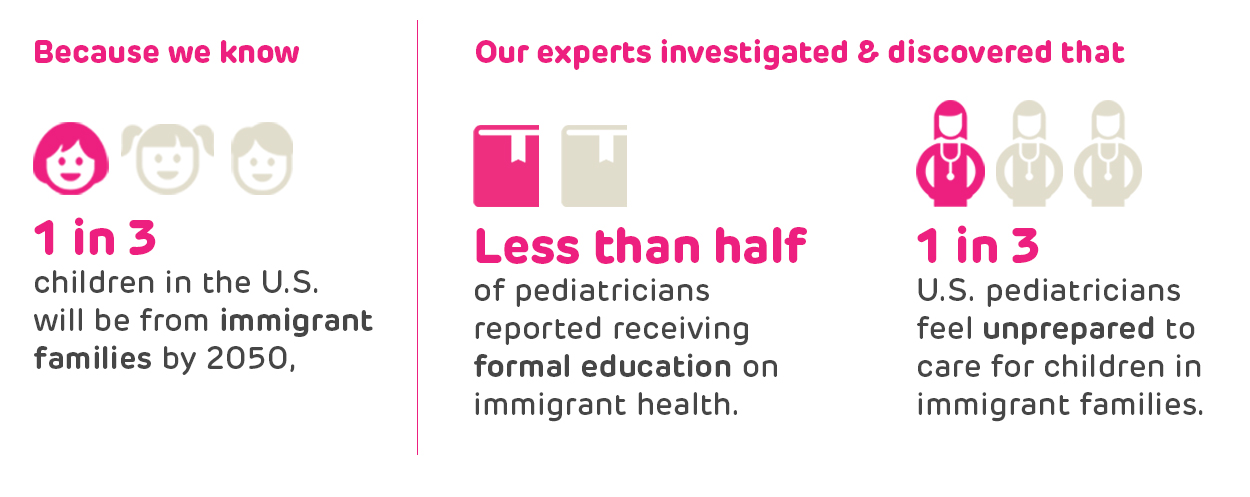Are Pediatricians Ready to Care for Immigrant Families in a Time of Crisis?
One in four U.S. children has at least one immigrant parent. This group, often called “children in immigrant families,” is exceptionally diverse. They include the children of Silicon Valley executives and the children of asylum-seekers. Regardless of their backgrounds, many of these families are experiencing fear and uncertainty related to the ongoing COVID-19 pandemic.

As pediatricians, we worry about children whose families are in detention, who have struggled to obtain health insurance, who are fearful of seeking care believing it might compromise a long-awaited application for permanent residence, or who simply do not yet know how to navigate U.S. health and emergency services. We worry about the one in three Latino and Asian American children whose parents are learning English. We worry that these families are not receiving messages about infection prevention in their preferred languages and that they are being boxed out of pediatric outpatient care by telemedicine technology that was not developed with interpreters in mind. We worry about the many immigrant parents who are essential workers in industries where they cannot work from home.
And we worry because even before COVID-19 placed additional strains on our health care system, experts at PolicyLab helped discover that one in three U.S. pediatricians reported feeling unprepared to care for children in immigrant families.
What’s Missing in Pediatric Care
Ensuring that every U.S. pediatrician is ready to care for these new American families should be a priority for medical educators. This is critical to ensuring pediatric care is safe and equitable during normal operations and doubly so during times of crisis. Pediatrician trainees should know how to manage health conditions that are common among immigrant communities and navigate medical-legal challenges unique to new American families, such as concerns about the public charge rule. And every pediatrician—not just trainees—must ensure that they have the skills necessary to effectively and accurately communicate with English-language learners.
These communications skills have been a neglected aspect of health education and we are now feeling the pinch. As outpatient practices close their doors to in-office visits, many pediatric providers are learning that their telemedicine technology does not include out-of-the-box solutions for working with interpreters. Many residents, who are now at the forefront in caring for critically ill children and adolescents, do not feel appropriately equipped to use interpreter services to communicate in languages other than English. And while communication curricula has been developed both in medical schools and residencies, the optimal time for implementing these training programs was before the current pandemic.
Adapting and Preparing for What’s Next
Especially during this time of crisis, we need to stay focused on the needs of new American families. Here are some actions we can take right now:
- Health systems should include language services experts in every step of pandemic response to ensure that patients with limited-English proficiency in intensive care units and COVID-19 wards are able to communicate with their doctors and nurses.
- Digital health teams need to quickly partner with experts in language access to address gaps in telemedicine for English-language learners and then quickly adopt metrics for telehealth equity.
- States need to require that Medicaid and other payers reimburse telemedicine offered via phone—otherwise families with limited literacy, limited digital literacy or limited access to Wi-Fi will be excluded from care.
- Public health messages that experts have translated into multiple languages need to be widely disseminated and updated regularly, and public health officials should disaggregate public health data on COVID-19 testing and outcomes by English proficiency status and race/ethnicity.
- Lastly, leaders in the immigrant child health community need to continuously advocate for the needs of immigrant families and families with limited English proficiency as health care systems, cities, states and the federal government strengthen and refine their pandemic response.
Over the next decade, pediatricians need to institutionalize immigrant child health education within our discipline, recruit more bi/multilingual and bicultural providers (including international medical graduates), and advocate for universal children’s health care coverage inclusive of immigrant children. We need to ensure that developing the skills necessary to work effectively with an interpreter becomes the expectation for every residency graduate.
And while we celebrate clinical programs optimized for new American families, we should also use our quality improvement infrastructure to ensure that every pediatric service line fully integrates language services and delivers equitable care to children regardless of race, ethnicity or language. Otherwise, we risk entering the next crisis no better prepared than we are now.
Christina Rojas, MD, is a pediatric resident at Children's Hospital of Philadelphia.
